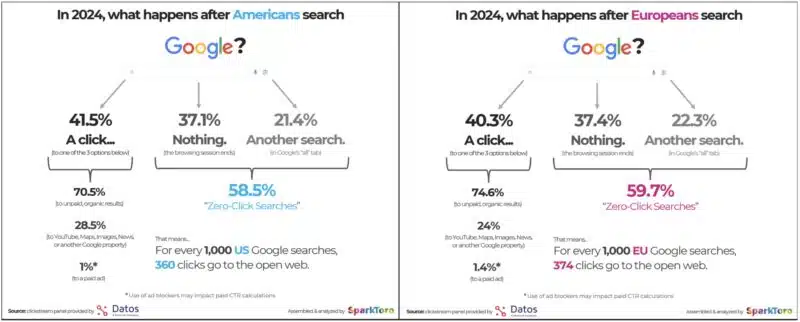If you’ve noticed that your Google search traffic has slowly trended down over the past 5-10 years, you’re not alone.
For some time, various studies have abounded on the rise of “zero-click” searches. A zero-click search occurs when a user does not click on any of the search results.
According to recent data from a joint study by Datos and SparkToro, 58.5% of Google searches in the U.S. and 59.7% in the EU result in zero clicks. This means that users either find the information they need directly on the search results page or abandon the search without clicking on any links.
Several factors contribute to this phenomenon. Google’s search results often provide rich snippets, direct answers, and other interactive elements that satisfy the user’s query without needing to click through to a website.
Additionally, Google’s own properties, such as YouTube, Google Maps, and Google Images, attract a significant portion of clicks. Nearly 30% of all clicks in the U.S. go to these Google-owned properties.
The rise of zero-click searches presents both challenges and opportunities for digital marketers. On the one hand, it reduces the amount of traffic directed to websites from search engines, which can impact visibility and conversions.
On the other hand, it emphasises the importance of optimising content to appear in these rich snippets and other direct answer formats.
Clicks to Google Properties
The study highlights a significant trend: a considerable portion of clicks go to Google properties. For every 1,000 Google searches in the U.S., 360 clicks go to the open web, while in the EU, this number is slightly higher at 374. This indicates that while zero-click searches are prevalent, there is still a substantial amount of traffic directed to external websites.
For businesses, this means that while traditional SEO remains important, there is also a need to optimise content for visibility within Google’s ecosystem. This includes creating engaging video content for YouTube, ensuring accurate business listings on Google Maps, and utilising Google Images effectively.
AI Overviews and Their Impact
The recent introduction of AI Overviews in the US, part of Google’s Search Generative Experience, has also influenced search behaviour.
Initially, AI Overviews were intended to enhance search results with AI-generated content, but their implementation faced criticism due to inaccuracies and potentially dangerous information. This led to a rollback of the feature.
Interestingly, while desktop searches saw a slight increase, mobile searches experienced a notable decline after the launch of AI Overviews. This suggests that users were not entirely satisfied with the AI-generated results, prompting Google to refine the feature further.
Regulatory Influences and Geographic Differences
The study also explores differences in search behaviour between the U.S. and the EU, highlighting the impact of regulatory environments.
The European Union’s Digital Markets Act aims to curb Google’s ability to favour its own properties in search results. While this has led to a slightly higher percentage of clicks to the open web in the EU, the difference is not as pronounced as one might expect.
Despite these regulations, Google continues to dominate the search market, with searches per searcher reaching historic highs in both regions. This underscores the search giant’s enduring influence and the ongoing need for marketers to adapt to its evolving ecosystem.
Strategic Takeaways for Marketers:
Given the rise of zero-click searches and the dominance of Google-owned properties, marketers must adjust their strategies accordingly. Here are some Sparktoro’s key takeaways and recommendations:
- Optimise for Rich Snippets and Direct Answers: Ensure that your content is structured to appear in rich snippets and other direct answer formats. This increases the chances of capturing user attention even if they do not click through to your site.
- Leverage Google Properties: Create content that performs well on Google-owned platforms like YouTube and Google Maps. This not only enhances visibility but also drives engagement within the Google ecosystem.
- Monitor and Adapt to AI Features: Stay informed about changes to Google’s AI features and adapt your content strategy to ensure it remains relevant and visible.
- Understand Regional Differences: Be aware of regulatory influences and regional differences in search behaviour. Tailor your strategies to comply with local regulations and optimise for the specific preferences of users in different regions.
Even with Google recently slowing down its rollout of AI overviews, it’s reasonable to expect Google’s recent teething issues to pass and zero-click searches to rise further in the future.
Combine this with a growing role for social media in search and discovery, and it’s not a stretch to say that unpaid search traffic might become more challenging to scale over the next 2-5 years.




RECOMMENDED FOR YOU
Google Rebuilds Checkout For AI Shopping
Agentic shopping has moved from theory to reality, and…
Agentic shopping has moved from theory to reality, and…
Google AI To Power Apple’s Siri
Apple has officially teamed up with Google in a…
Apple has officially teamed up with Google in a…
Google’s Nano Banana AI App Fuels Growth
Google’s latest AI success story is not a productivity…
Google’s latest AI success story is not a productivity…